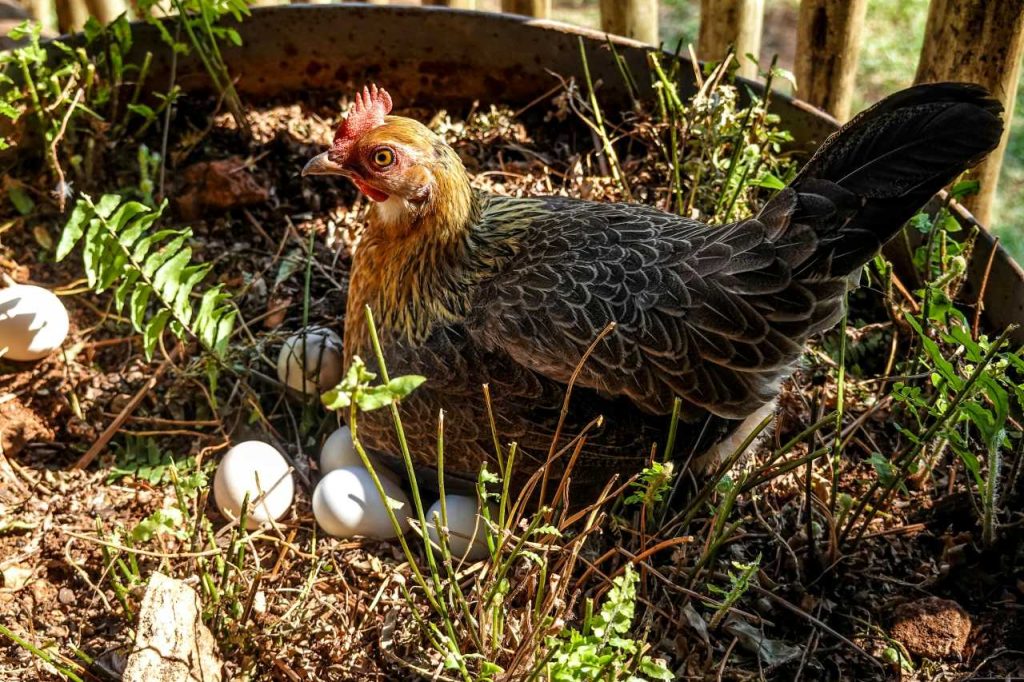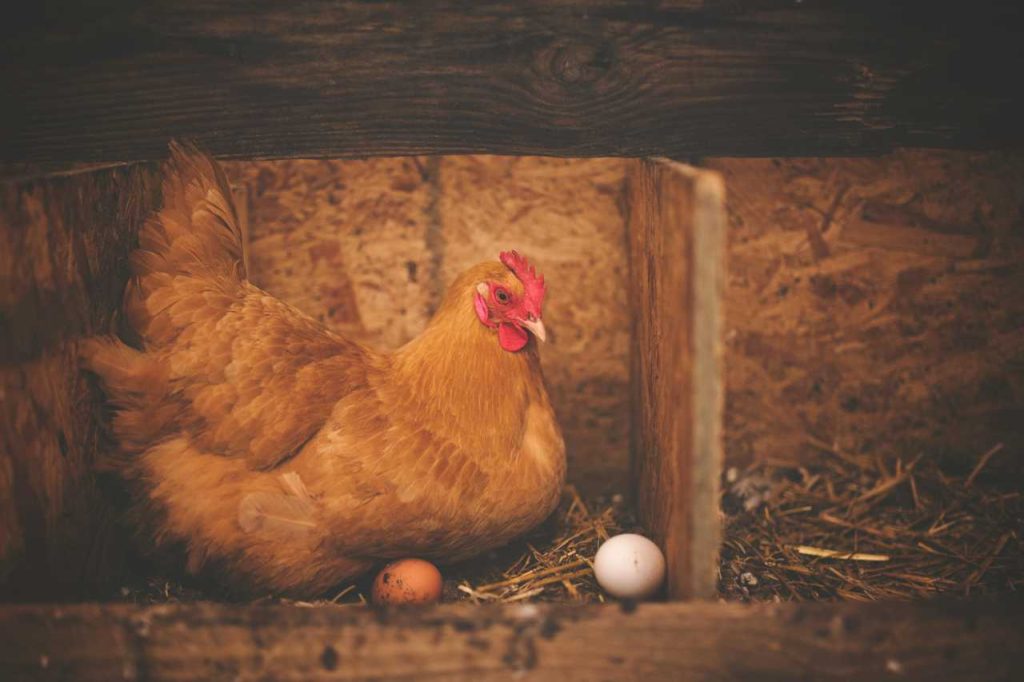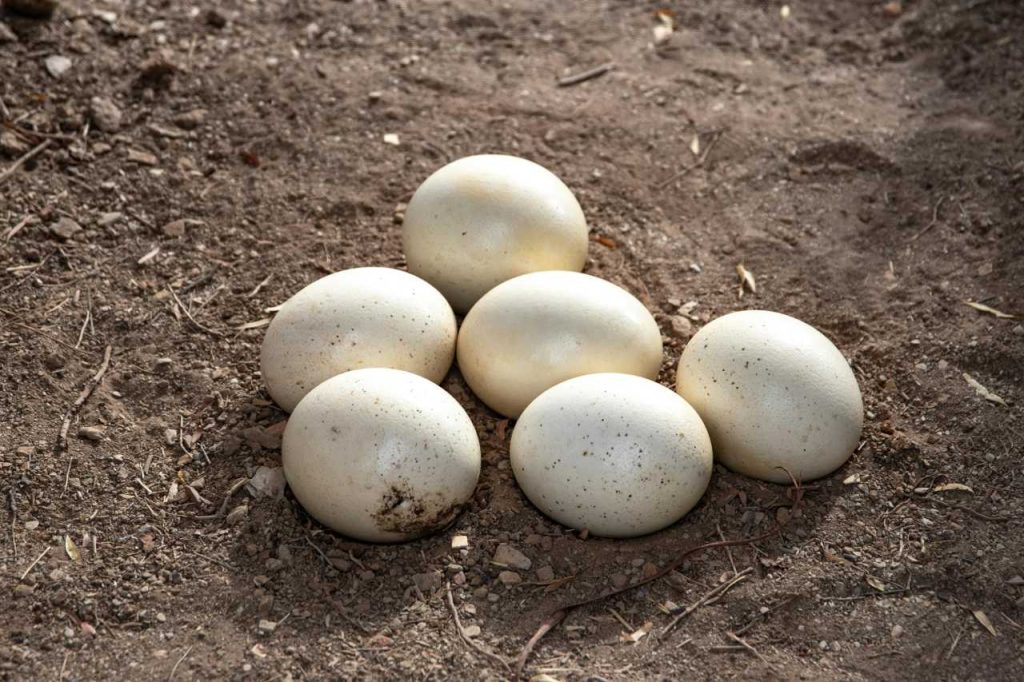If you’ve ever kept chickens or are planning to start, understanding the egg-laying timeline of your hens is crucial. Chickens are wonderful egg producers, but they don’t lay eggs indefinitely. So, how long do chickens lay eggs, and what factors affect their egg-laying capabilities?
In this blog, we’ll explore the average lifespan of a hen’s egg-laying productivity, what influences egg production, and how you can ensure your hens lay eggs as long as possible. Let’s dive in!

1. When Do Chickens Start Laying Eggs?
Chickens typically begin laying eggs when they reach sexual maturity, which is usually between 18 to 24 weeks of age. This can vary slightly depending on the breed, diet, and environmental conditions, but most hens will begin laying by this time.
- Light Breeds: Breeds such as Leghorns and other high-production hens tend to start laying earlier, sometimes around 16 weeks.
- Heavy Breeds: Larger breeds like Brahmas or Cochins may take a bit longer, starting to lay around 22–24 weeks.
2. How Long Do Chickens Lay Eggs?
Once a hen starts laying eggs, her most productive egg-laying period is during her first 2–3 years of life. After this, egg production declines gradually, but many chickens continue to lay sporadically for several more years.
Year-by-Year Breakdown:
- First Year: In the first year of laying, hens can produce an impressive number of eggs. Most breeds lay around 250–300 eggs per year, which equates to about 5–7 eggs per week.
- Second Year: After the first year, egg production typically decreases by around 10–20%. In the second year, hens may produce 200–250 eggs annually.
- Third Year: By the third year, egg production slows further. Expect around 150–200 eggs per year, depending on the breed.
- Fourth Year and Beyond: After three years, most hens will produce fewer than 150 eggs annually, and some may only lay 50–100 eggs per year. Older hens can still lay eggs but much less frequently and often not year-round.
3. Factors That Affect How Long Chickens Lay Eggs
Several factors can influence a hen’s egg-laying capacity, including breed, diet, light exposure, and health. Here’s a closer look at these key factors:
Breed
Some chicken breeds are naturally better egg layers than others. For instance:
- High-production breeds like the Leghorn, Rhode Island Red, and Plymouth Rock are known for their excellent egg production. These breeds can continue laying a significant number of eggs even into their later years.
- Ornamental breeds such as Silkies and Polish are more likely to be sporadic layers and may lay fewer eggs overall.
Nutrition
A well-balanced diet plays a crucial role in a hen’s ability to lay eggs consistently. Layer feed, which contains around 16–18% protein and plenty of calcium, ensures that hens have the nutrients they need for egg production.
- Protein is vital for feather development, growth, and the production of high-quality eggs. During times of molting, hens require even more protein to regrow feathers and continue laying.
- Calcium is necessary for the formation of strong eggshells. A lack of calcium can result in soft-shelled eggs or cause hens to stop laying altogether.
Daylight Exposure
Daylight is one of the biggest influences on a chicken’s egg-laying cycle. Chickens need around 14–16 hours of daylight to maintain consistent egg production. When daylight hours shorten in the fall and winter, hens naturally produce fewer eggs, as their bodies conserve energy during darker months.
- Artificial lighting: Some chicken keepers use artificial lighting in the coop to extend daylight hours and encourage egg production during the winter. This can help maintain egg-laying consistency but may cause earlier burnout in the hens.
Health and Stress
- Molting: Chickens go through a natural molting process, usually in the fall, where they shed old feathers and grow new ones. During this time, hens may stop laying altogether as they focus on feather regrowth.
- Stress: Changes in the environment, such as moving the coop or introducing new flock members, can cause stress and disrupt egg production. Predators, illness, or poor living conditions also contribute to stress and can reduce egg-laying frequency.
- Illness: Chickens that are sick or suffering from parasitic infestations like lice or mites may stop laying eggs. Regular health checks and proper coop management are essential to keep your hens healthy and productive.
4. Extending Egg-Laying Productivity

While the natural decline in egg production is inevitable, there are ways to help your chickens lay eggs for a longer period:
Provide a High-Quality Diet
A balanced diet with sufficient protein and calcium can support ongoing egg production. Consider supplementing their regular feed with high-protein snacks like mealworms, sunflower seeds, or scrambled eggs during molting or times of stress.
Keep Stress Levels Low
Ensuring a calm and consistent environment can go a long way in maintaining egg production. Keep the coop clean, provide ample space for your chickens, and avoid unnecessary changes in their routine.
Provide Adequate Light
If you live in an area with short daylight hours during the winter months, adding artificial lighting can help keep egg production steady. Make sure the light is timed to ensure at least 14 hours of light per day, but avoid overexposing the hens to too much artificial light, which can lead to premature exhaustion of their egg-laying capacity.
5. When Do Chickens Stop Laying Eggs?

Chickens usually begin laying fewer eggs after their third year, but they can continue laying intermittently for many years. However, by the time hens are 6–7 years old, most will have significantly reduced egg production or stopped laying altogether.
Older Hens:
Even though older hens may stop laying, they still contribute to the flock in other ways. They are excellent foragers and often act as flock leaders, helping younger hens navigate pecking orders and learn behaviors.
Some chicken owners keep older hens as part of the flock for their companionship and pest control abilities, while others may choose to cull non-laying hens to maintain a productive flock.
Conclusion
Chickens can lay eggs for several years, but their most productive period typically lasts for the first 2–3 years. After that, egg production gradually declines, but with the right care, proper nutrition, and adequate light, you can help your hens maintain good egg-laying habits for as long as possible. While older hens may not lay as frequently, they can still be valuable members of your flock.
By understanding how long chickens lay eggs and the factors that affect egg production, you can better plan your flock’s management and ensure a steady supply of fresh eggs for years to come!
